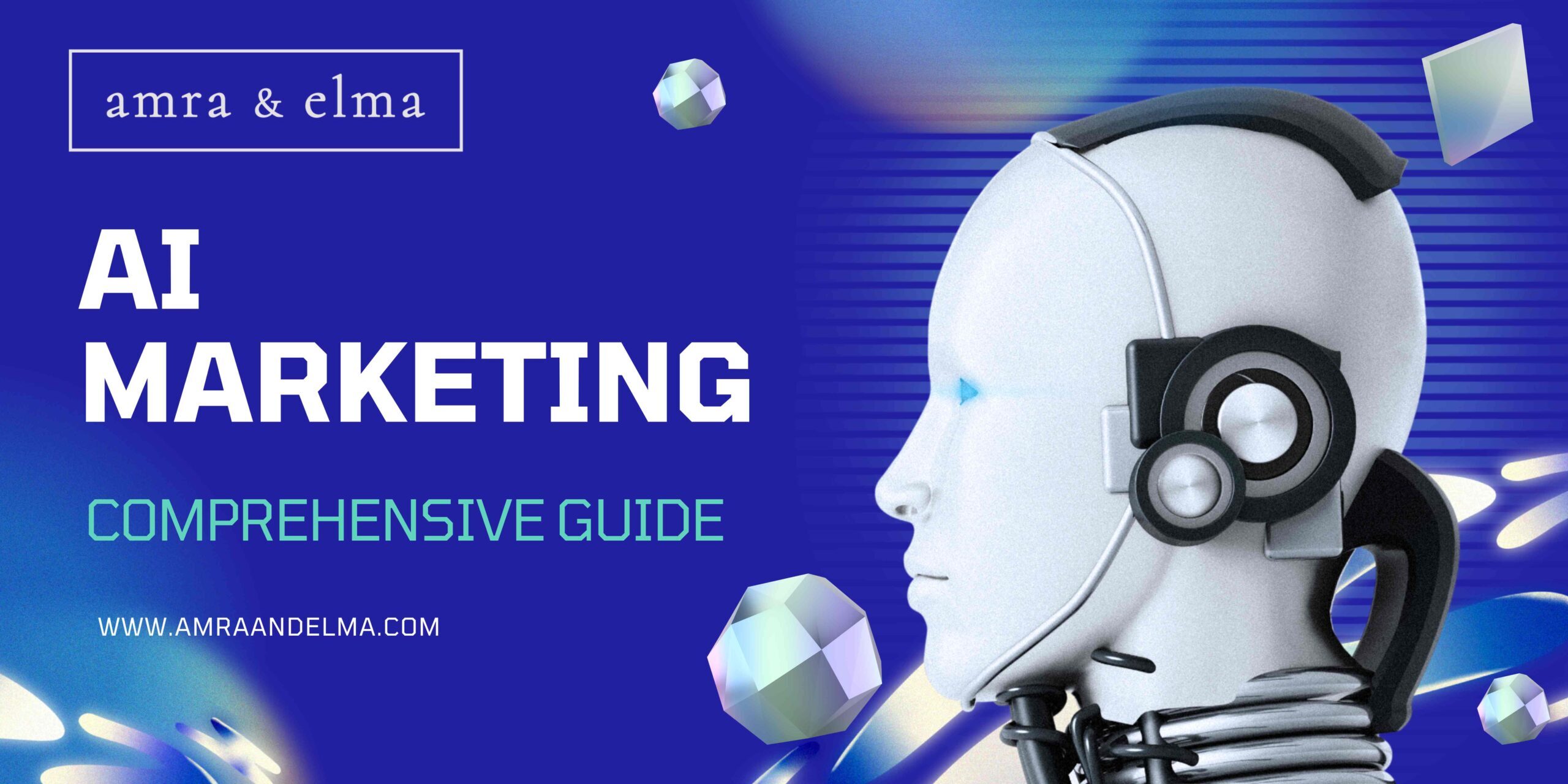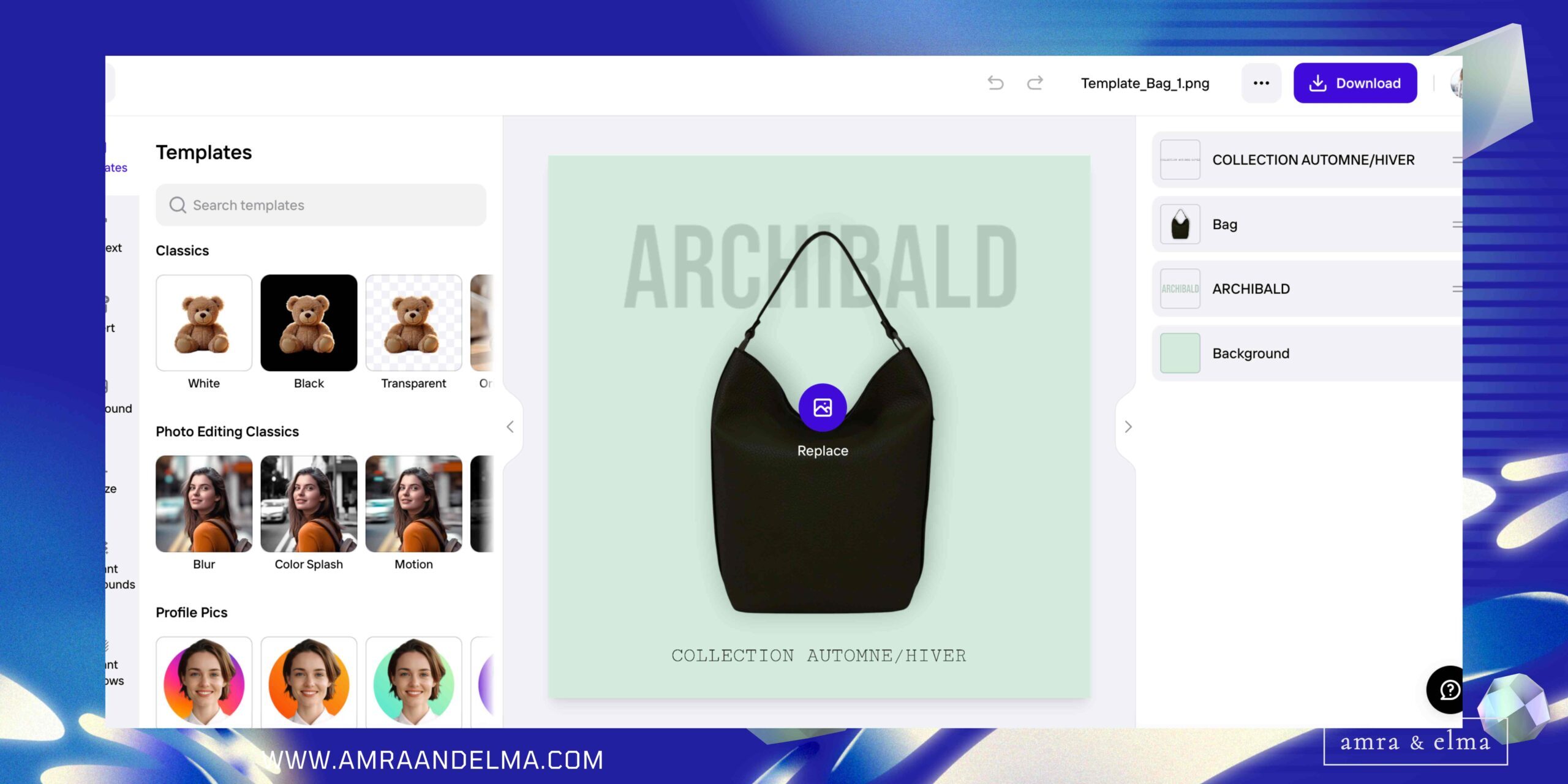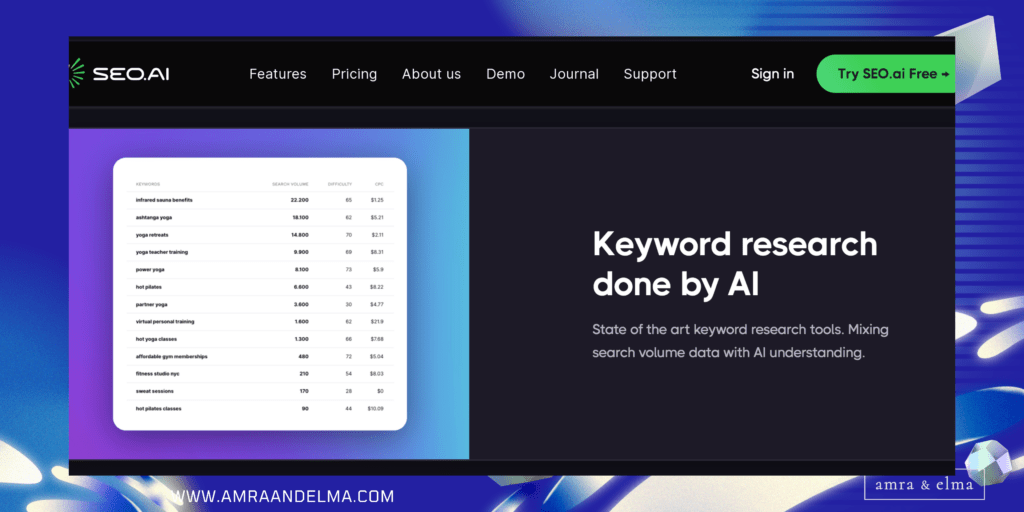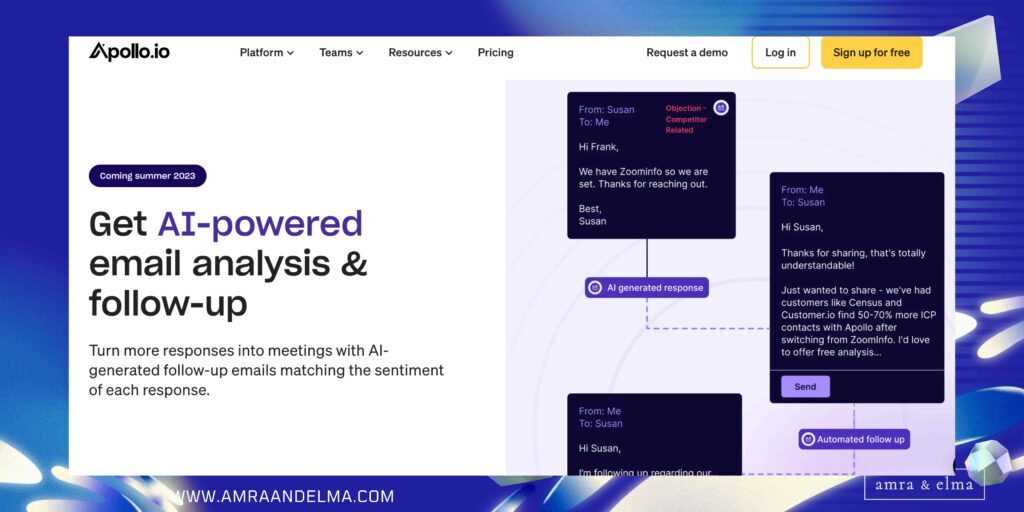
11 Dec AI MARKETING – COMPREHENSIVE GUIDE
The integration of Artificial Intelligence (AI) into marketing strategies has transformed small businesses seeking to get a leg up on their competition, increase productivity, boost creativity and innovation and ultimately drive their sales. Leveraging AI marketing can not only streamline processes but also elevate the quality, popularity, impact and revenue of a brand’s marketing campaign. Below, we will explore strategic ways to incorporate AI into your marketing efforts in order to quadruple your brand’s popularity and sales.
Below, we at Amra & Elma have compiled a comprehensive guide for AI marketing in 2024 and how AI can be utilized to revolutionize your marketing and sales.
AI Marketing in 2024 (Editors Choice):
- AI marketing can completely eliminate the need for photographers and photo editors creating professional e-commerce images
- AI Marketing can be utilized to create landing pages and blog posts at scale
- AI marketing can be used to develop social media posts (photos and videos) that engage audiences
- AI marketing can be utilized to develop a social media posting calendar along with captions
- AI marketing can be utilized to optimize content for SEO driving organic website traffic
What is AI Marketing?
AI marketing includes the strategic utilization of advanced AI tools to optimize marketing strategies, enhance operational efficiency, and boost overall performance. This approach includes various aspects of marketing, encompassing the integration of AI in SEO, content marketing, and content planning. Additionally, it extends to utilize AI’s capabilities across multiple roles, serving as an expert branding specialist, stylist, photographer, and editor. This multidimensional utilization ensures that marketers are able to develop flawlessly executed product photography and engaging social media posts without necessarily doing the extensive work themselves. The profound impact of AI marketing lies in its democratization of scalability, enabling marketers to achieve levels of productivity, quality and scale previously reserved for larger corporations with large teams. This paradigm shift eliminates the need for large resources, allowing even small businesses to achieve comparable scale by strategically incorporating AI tools into their marketing strategies.
AI marketing extends beyond creative services like content creation and editing. It dives into the aspects of data analysis, leveraging AI’s capacity to analyze vast amount of customer data and scrape extensive databases in order to equip marketers with highly relevant insights. In the field of email marketing, AI becomes a game-changer. It enables marketers to extract a vast array of contacts, personalize numerous emails, craft tailored email content, and meticulously analyze the outcomes of email campaigns (think open rates, bounce rates, but also more complex tasks like A-B testing in order to determine better content and response rates). Furthermore, it grants marketers the capability to effortlessly engage with potential customers who add items to their carts while surfing a brand’s website, proactively nudging them towards completing their purchase. This level of automation and personalized interaction is evidence for AI’s transformative potential within the marketing landscape, enhancing both efficiency and sales in ways not seen before.

1. AI Marketing and Content Production: AI-Driven Product Photography
The evolution of AI has been nothing short of transformative, particularly in the realm of content creation, specifically for product photography. Platforms like Photoroom have not just simplified but revolutionized the process of generating exceptional product visuals. Gone are the days of extensive studio setups or the need for specialized photographers and stylists. Now, armed with just a smartphone and a user-friendly app, anyone can delve into the realm of professional-grade product photography.
Photoroom’s AI-powered technology acts as a virtual studio, turning the humble smartphone into a powerful creative tool. With a mere snapshot, users gain access to an array of options, enabling the specification of desired backgrounds or selecting from suggested variations. This AI-driven magic swiftly transforms ordinary product images into captivating visuals, effortlessly offering diverse backgrounds that previously necessitated elaborate setups and a team of experts.
The brilliance lies in its simplicity. What once required significant investments in time, resources, and personnel can now be accomplished swiftly and efficiently. The app’s intuitive interface makes the process accessible to novices and professionals alike, democratizing high-quality photography in a way that was previously unimaginable.
Whether it’s altering backgrounds, enhancing lighting, or refining details, Photoroom’s AI capabilities elevate product photography to new heights, empowering businesses to curate visually stunning content that resonates with their audience. In essence, it’s a testament to how AI-driven innovation is reshaping the creative landscape, making once-complicated tasks as simple as a few taps on a smartphone screen.

2. AI Marketing and Content Marketing: AI Driven Landing Pages and Blog Posts
Artificial Intelligence has revolutionized content creation for marketers via platforms like ChatGPT and Jasper. These AI-driven tools serve as assistants, quickly generating relevant, on-point content that aligns with brand’s identity and resonates with their target audience.
Their natural language processing ability allows marketers to produce variety of content—blog posts, social media updates, emails, and website copy—quickly and efficiently. By utilizing AI, professionals can focus more on strategy and creativity, relying on these platforms to speed up the content generation process.
According to Surfshark, AI allows one copywriter to boost their efficiency by 3 times while elevating their quality, clarity, and consistency of writing. They are able to think of different ways of integrating brand messaging, tone, and innovative storytelling while utilizing an AI to do the heavy lifting of more tedious tasks such as checking grammar, providing synonyms or improving the sentence structure.
This collaboration between human expertise and AI capabilities not only saves time but also allows for a consistent flow of high-quality content across different channels, boosting engagement and optimizing resources in content marketing efforts.
3. AI Marketing and Social Media: Post Design
Crafting visually appealing social media posts is vital for brand’s social media engagement. AI-powered tools such as Canva simplify this process, allowing marketers to craft stunning visuals that capture attention and boost engagement.
By leveraging Canva’s AI-driven features, marketers can efficiently design social media posts without the need for extensive graphic design knowledge. The platform streamlines the creation process, offering multiple templates and easy to use tools that enable marketers to generate beautifully composed visuals tailored to brand’s DNA.
This fusion of AI and design not only simplifies the creation process but also ensures that brands consistently produce great content that resonates with their audience. It’s a game-changer in enhancing visual storytelling and boosting engagement across social media platforms.

4. AI Marketing and Social Media Posting – Social Media Posting Calendar
Social media scheduling can sometimes present a challenge for marketeers, yet AI, like ChatGPT, simplifies this task. By analyzing trends and audience behavior, AI efficiently composes strategic posting calendars, optimizing engagement and following.
Harnessing ChatGPT’s capabilities, marketers can streamline scheduling processes. This AI-driven analysis empowers brands to align their content with peak engagement times, enhancing reach and relevance with their audience.
The integration of AI into social media scheduling not only minimizes the logistical hurdles but also maximizes the potential for meaningful audience interactions, elevating the overall impact of marketing efforts.
5. AI Marketing and Photo Editing: Professional Photo and Video Editing
Gone are the days of hefty fees and lengthy waits for photo editors to transform images into magazine-worthy visuals. AI, exemplified by tools like Picsart, revolutionizes this process, accomplishing what would take hours for a photo editor in mere seconds.
AI-powered tools like Picsart democratize professional-level photo editing, eliminating the need for exorbitant fees or extensive editing expertise. Marketers now wield the power to refine visuals swiftly, from mundane to masterpiece, effortlessly.
This technological leap not only saves time and resources but also democratizes access to high-quality visual refinement, empowering marketers to craft captivating visuals that resonate with their audience.
6. AI Marketing and SEO: Ranking and Website Traffic
SEO’s role in online visibility is vital, and AI tools like SEO.ai redefine its impact. By harnessing proprietary algorithms and detailed Google SERP analysis, these tools quickly uncover valuable keywords and craft optimized content, resulting in a significant boost in organic traffic.
The power of AI in SEO optimization streamlines the process of keyword discovery and content generation. This enables marketers to align their content strategy precisely with search engine algorithms, enhancing online visibility and driving organic traffic growth.
The integration of AI in SEO not only amplifies efficiency but also ensures that businesses stay ahead in the digital race by consistently adapting their content strategies to the evolving search landscape.

7. AI Marketing and PPC: Optimization of Ad Buying
Gone are the days of hiring PPC managers for exhaustive data research to uncover optimal keywords and fine-tune ad strategies for clicks. Machine learning, exemplified by platforms like Acquisio, is the driving force utilizing AI marketing to transform PPC campaigns.
The power of AI and machine learning technology allows for dynamic bid and budget adjustments by analyzing data intricately. This optimization process not only maximizes campaign performance but also ensures an exceptional Return on Investment (ROI) by adapting to real-time market trends.
AI-driven PPC optimization eliminates the need for manual intervention in bid management and keyword selection, offering marketers unparalleled efficiency and precision in driving campaign success. It’s a testament to how AI is reshaping PPC strategies, allowing businesses to stay agile and competitive in the ever-evolving digital advertising landscape.
8. AI Marketing and Email Campaigns: Automatization and Scalability
AI marketing has revolutionized email campaigns resulting in unparalleled efficiency and scalability. Its application in developing email content and subject lines allows for a complete transformation in open and response rates. Through AI’s capabilities, email copies and subject lines are tailored so that email marketers can send thousands of emails in less than an hour.
Moreover, AI facilitates personalization at scale, seamlessly incorporating individual details like names, company affiliations, or locations into copy. The potential customer’s experience is transformed as the copy looks very personalized and tailored to their needs. The technology goes beyond content creation, enabling the scraping and sorting of extensive contact lists, isolating the most relevant ones for targeted outreach. This level of automation not only streamlines the process but also ensures that marketing efforts are laser-focused, driving higher engagement and conversion rates within each email campaign.

AI Marketing – In Conclusion
Integrating AI into your marketing strategy is no longer just an option; it’s a necessity in today’s competitive landscape. By adopting these seven AI-driven methodologies, businesses can not only streamline their marketing efforts but also enhance engagement, drive conversions, and stay ahead in the digital realm.
The era of AI-driven marketing is here, offering unparalleled opportunities for innovation and success. Embrace these technologies, and witness your marketing campaigns soar to new heights.
AI MARKETING IN 2024 – FAQ:
How AI will be used in marketing?
AI plays a pivotal role in modern marketing, simplifying various tasks and improving outcomes. For instance, it can create engaging content for social media posts or blogs, saving time and effort for marketers. In email campaigns, AI can personalize messages based on recipients’ preferences or behaviors, increasing open rates and conversions. Moreover, AI-powered tools analyze data to identify keywords or trends, optimizing website content for search engines and enhancing online visibility. These applications not only streamline processes but also empower marketers to make informed decisions, leading to more effective and targeted strategies.
What is best AI for marketing?
Determining the best AI for marketing depends on specific needs and goals. Several AI tools cater to different aspects, offering varied functionalities. For content creation, tools like ChatGPT or Jasper excel, while Canva stands out for designing visuals. SEO optimization benefits from platforms like SEO.ai, whereas Acquisio dominates in PPC management. For email personalization, AI-driven tools like Phrasee or Persado have been popular with marketeers. The “best” AI in marketing largely depends on the specific area requiring enhancement—whether it’s content creation, SEO, PPC, or personalized customer engagement—each tool specializes in different facets, necessitating a tailored selection based on the marketing objectives at hand.
How to use ChatGPT for marketing?
Using ChatGPT for marketing involves several strategies. First, it can help generate engaging content for social media posts, blogs, or advertisements, ensuring consistency and quality. Additionally, ChatGPT can assist in customer interactions, providing timely and personalized responses on various platforms, enhancing engagement. For email marketing, it aids in drafting compelling email copies or subject lines to boost open rates. Moreover, ChatGPT’s ability to analyze data and trends can inform marketing strategies, offering insights into customer preferences or industry trends. Overall, integrating ChatGPT into marketing efforts can streamline content creation, improve customer interactions, and refine strategies for better engagement and outcomes.
Does AI marketing actually work?
Yes, AI marketing has demonstrated its effectiveness across various fronts. It streamlines processes, optimizes campaigns, and enhances customer engagement. AI’s data analysis capabilities enable more targeted and personalized marketing efforts, resulting in improved ROI for many businesses. By automating tasks and providing valuable insights, AI helps marketers make informed decisions, ultimately leading to better outcomes. Numerous success stories and case studies showcase the tangible benefits of AI in marketing, making it a proven and valuable tool in today’s competitive landscape.
Can you make money with AI marketing?
Absolutely, AI marketing presents significant opportunities to generate revenue and boost profits. By leveraging AI tools and technologies, businesses can optimize their marketing strategies, leading to increased efficiency and effectiveness in reaching their target audience. AI helps in identifying trends, analyzing customer behavior, and personalizing marketing campaigns, which can result in higher engagement and conversions. Moreover, AI-driven automation streamlines processes, saving time and resources, thereby improving the overall cost-effectiveness of marketing efforts. Businesses that effectively integrate AI into their marketing strategies often experience improved ROI and revenue growth due to more targeted and impactful campaigns.

